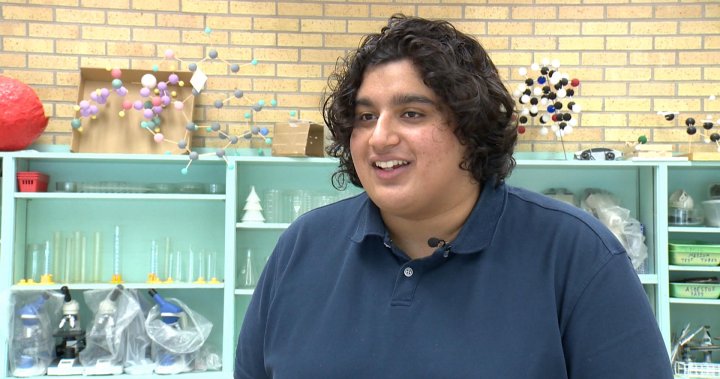“I feel so much more confident in my decision to follow this career path,” said Grade 12 student Aishah Salaudeen after a group of doctors headed to a Saskatoon high school Friday to spark interest in medical careers in Saskatchewan.
Grade 11 and 12 students from Walter Murray Collegiate learned about career options and planning and participated in medical simulators.
“I loved the ultrasound and getting the chance to meet them one on one and ask them questions; no emails, no online blogs, just meet the doctor and ask how their experience has been and ask personal questions,” said Salaudeen, who is considering a post-secondary degree in medicine.
“All of the reasons I debate doing it were all challenged today and were all answered in this session,” she added.

Henry Bi, from the anesthesiology department at the University of Saskatchewan, told the classroom the average entry grade for medical school is 88 per cent and having a career in medicine doesn’t need to take away from other aspects of life.
“It’s because we want well-rounded individuals who do other things in life,” Bi told the students. “Whether you volunteer, work part-time, or you do sports and have all of these other extra-curricular activities that keep you really busy but might affect your mark. Those things will actually make you a better physician when you are done.”
Bi said they are looking for people with good communication skills and a resilient attitude to help curb the province’s medical crisis.
“The goal is that upon your completion, you stay and work in Saskatchewan and serve the community. That is our primary and really only objective,” Bi said.
“Every single medical specialty is in dire need across Canada, not just Saskatchewan. We need family physicians, pediatricians, surgeons, anesthesiologists.”
“The issue right now is that there are a lot of opportunities in other places,” said Grade 12 student Rafay Ahmad, who is considering a career in medicine or law after graduation. “For example, even if you want to look at medical school or pursue residency or a career, you are usually looking at Ontario and B.C. as hubs of research and resources, so I think it is really on the government to invest in public resources.”
“If, for me as a student, there is opportunity elsewhere, there is really no reason to stay in Saskatchewan,” said Ahmad. “Just connections itself isn’t a good justification, prioritizing your career and the opportunity is more important.”
Bi said that students who do their post-secondary are much more likely to work in the province after graduation versus those studying from other provinces.
“If they are from a different province and they are looking to expand their own families, it is much easier to be closer to your family. Being a physician has a lot of demand on your work-life balance and having assistance from family is a lot more important than any financial enticement.”

Saskatchewan has released several new incentive programs to keep doctors practicing in the province.
In May, the provincial government announced doctors will be able to get a base rate for a standard range of services for each patient but will also get additional fee-for-service payments for extra services outside that standard range.
The Saskatchewan Medical Association said this new model will also support the recruitment and retention of doctors in family medicine.
Ahmad noted that while researching careers after graduation, he noticed the University of Saskatchewan’s recent incentive, the Saskatchewan Index, which prioritizes people that have connections to the province when considering applications to medical school.
“I believe those kinds of things are important to engage people to stay in the province itself, so people aren’t leaving,” said Ahmad.
Bi said his group at the University of Saskatchewan is trying to recruit employees without focusing on financial incentives.
“It would be very important for our group in the fall to go out to rural areas and engage students and bring along students of mine and from other disciplines that are from the same community,” he explained. “For someone who is from that community to tell those kids, ‘Hey, I sat at that desk ten years ago and dreamed and made it,’ it is a very powerful message.”
He added that their department is working on creating new scholarships for students in the fall not just for financial assistance, but to allow students to form networks with Saskatchewan’s medical community.
© 2023 Global News, a division of Corus Entertainment Inc.






